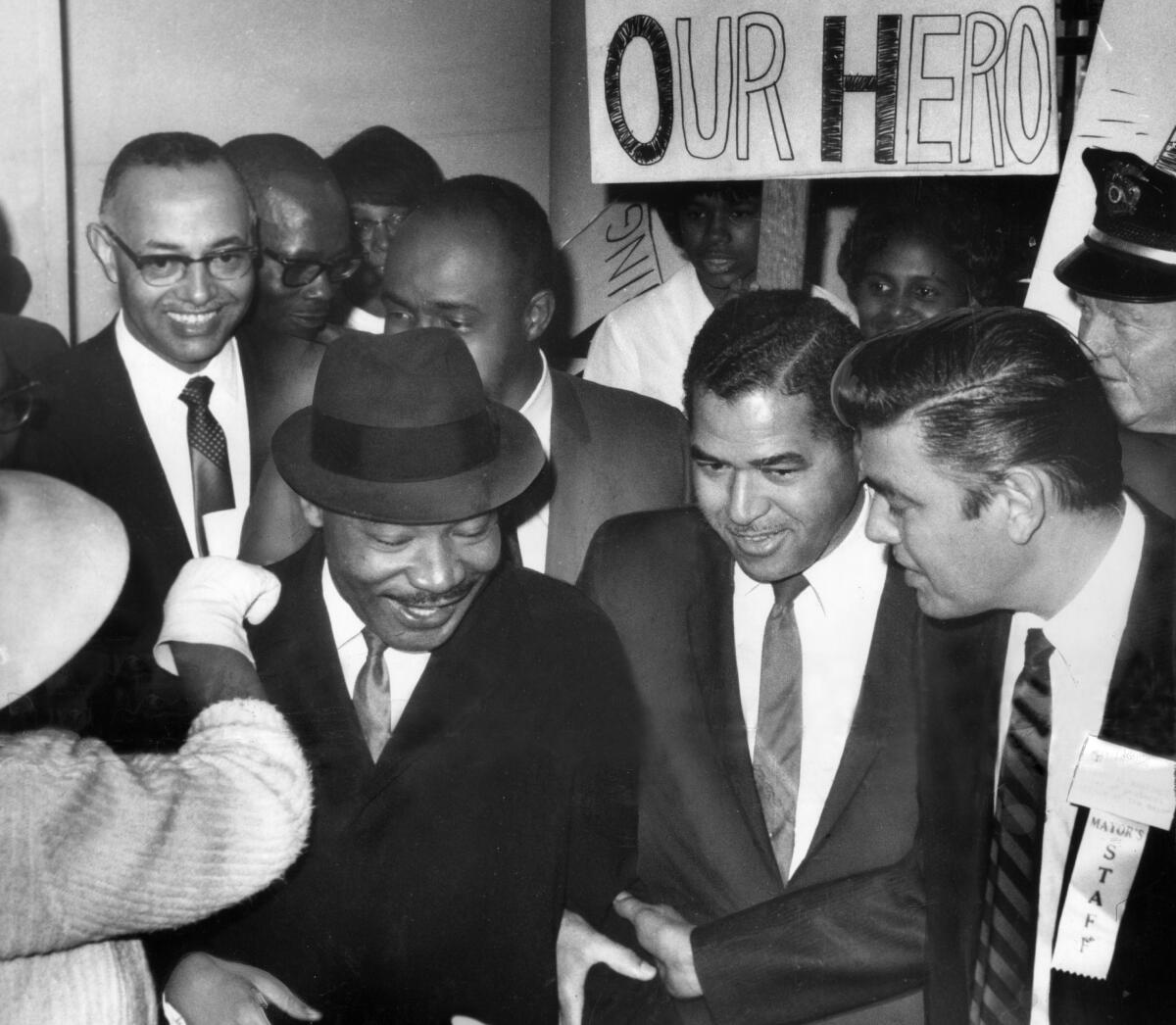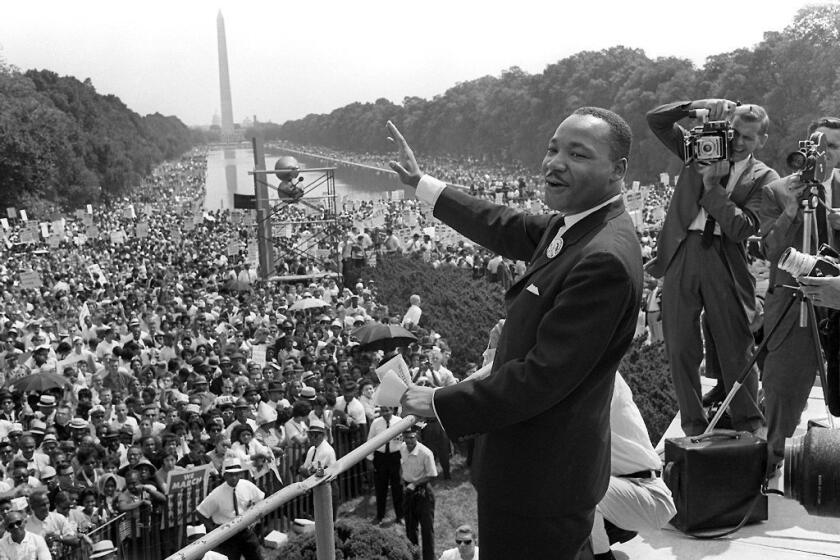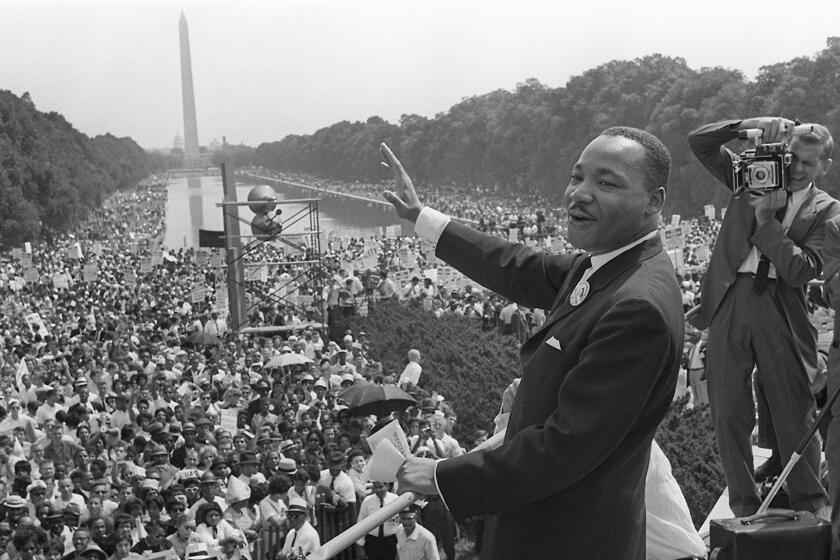Justice for the downtrodden came too slow in Martin Luther King Jr.’s time. It still does

- Share via
Shortly after the historic Birmingham civil rights campaign in early 1963, when police battled protesters with attack dogs and fire hoses, and threw the Rev. Martin Luther King Jr. in jail, King came to Los Angeles.
It wasn’t his first visit. He had been to L.A. many times to fundraise, to rally supporters and to speak of the work he and many thousands of others were doing in the South to end the American system of apartheid, still enforced by many states despite the Supreme Court’s rulings that enforced segregation violated the U.S. Constitution’s guarantee of “equal protection of the laws.”
But the post-Birmingham visit at a May 26 Freedom Rally was especially noteworthy in that it amplified in California and around the nation the message King had set forth in his famous letter from the Birmingham jail to answer objections that the campaign for civil rights was ill-timed: The right time to do right is always now, and delay in protecting equal rights has serious consequences.
In many ways, the Rev. Martin Luther King’s legacy was on display this past year as tens of thousands poured into the streets saying they would no longer tolerate police brutality against Black Americans.
There is urgency in the current moment, he said at L.A.’s Wrigley Field in South L.A. (long since demolished), using words that are equally true today.
“All these years we have been cooling off,” he said, “and the danger is we will end up in a deep freeze.”
King spoke in Los Angeles again the following year, to support civil rights legislation that was stalled in Congress. He addressed the assertion by some self-described moderates that a change in law was less important than a change in the hearts of racists.
“It may be true that morality cannot be legislated, but behavior can be regulated,” King said at the L.A. Memorial Coliseum in 1964. “It may be true that the law cannot change the heart, but it can restrain the heartless…. It may be true that the law can’t make a man love me, but it can restrain him from lynching me, and I think that’s pretty important also.”
A year later, after the Civil Rights Act had been signed into law and with the Voting Rights Act of 1965 pending before Congress, King spoke at Temple Israel in Hollywood about the continuing reluctance on the part of many Americans to move forward on civil rights and equal justice. Anger was simmering among Black people in Los Angeles over their mistreatment by police, and by the injustices of segregation that, while not on the books as it had been in Birmingham and elsewhere in the South, were glaringly real and rooted in unequal education, hiring, housing and healthcare. The Watts riots were a few short months away.
Segregation of any kind is wrong, King told the congregation, because it is “nothing but a new form of slavery covered up with certain niceties of complexity.”
Nor, he said, is segregation exclusively based on race. It can be found in the hundreds of thousands of “untouchables” living on the streets of India, and among people everywhere living in poverty while surrounded by wealth.
The U.S. has changed much in the more than half a century since King’s assassination, but he would surely recognize and lament what he’d see — in the continuing police brutality disproportionately aimed at Black Americans and other people of color, and the reluctance of Congress to address it with legislation like the George Floyd Justice in Policing Act; in state laws that attempt to limit voting, although without the blatant references to race that are no longer permitted; and in Congress’ failure so far to pass the John R. Lewis Voting Rights Advancement Act. He might see it, too, in the streets of Los Angeles, lined with homeless people who are disproportionately Black, with untreated illnesses, amid enormous wealth.
When is the right time to fix these problems? We know what King would say, because he said it so often during his lifetime. “Over the bleached bones and jumbled residue of numerous civilizations are written the pathetic words: ‘Too late,’” King still reminds us. We are confronted with “the fierce urgency of Now.”
More to Read
A cure for the common opinion
Get thought-provoking perspectives with our weekly newsletter.
You may occasionally receive promotional content from the Los Angeles Times.











